Picture
Your Present Location: HOME> PictureThe State Counsellor of the Republic of Kazakhstan Visits Renmin University of China
On November 22, 2024, Erlan Karin, the State Counsellor of the Republic of Kazakhstan, visited Renmin University of China (RUC) to deliver a speech on the theme of “Kazakhstan’s Reforms and the China-Kazakhstan Permanent Comprehensive Strategic Partnership.” This event was hosted by Renmin University of China and organized by the Chongyang Institute for Financial Studies, Renmin University of China (RDCY). Zhu Xinkai, Executive Vice President of RUC, delivered a welcoming remark, while Wang Wen, Dean of RDCY, presided over the entire event. Over 200 attendees included faculty, students, and alumni of RUC, international students from Central Asian countries including Kazakhstan, as well as representatives from the business community, investment sector, media, and academia. Nearly 20 domestic and foreign media such as CGTN, Belt & Road Outlook, China Daily, China News Service, Beijing Review, Capital News, Shenzhen Satellite TV, Phoenix Satellite TV, 24KZ, Khabar Agency, and others were also present.
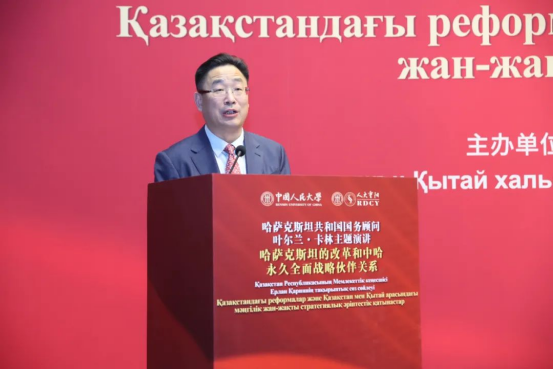
In his welcoming remarks, Zhu Xinkai first expressed RUC’s sincere welcome to Erlan Karin and his delegation. He noted that this year marks the 32nd anniversary of the establishment of diplomatic relations between China and Kazakhstan. In July of this year, President Xi Jinping successfully visited Kazakhstan, and both countries signed the Joint Statement, injecting strong momentum into the development of a new “golden 30 years” for bilateral relations. Currently, Renmin University of China (RUC) is actively implementing the Global Development Initiative (GDI), Global Security Initiative (GSI), and Global Civilization Initiative (GCI) proposed by President Xi Jinping and continuously strengthening cultural exchanges and cooperation with Kazakhstan. He mentioned that the Tongzhou Global Development Forum, founded by Renmin University of China, has become an important annual gathering platform for scholars from China and Kazakhstan. Looking ahead, the potential for bilateral cooperation between China and Kazakhstan is immense, with a bright outlook. He looks forward to the China Tourism Year in Kazakhstan next year, which will continue to strengthen cooperation between China and Kazakhstan in culture, education, and other fields, enhancing mutual understanding between the two peoples. Both sides should seize this historic opportunity to push China-Kazakhstan cooperation and relations to a new level.
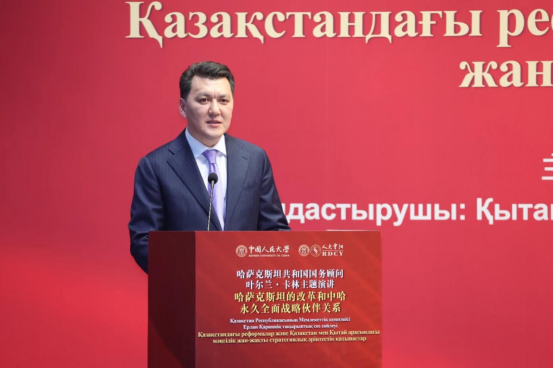
Following that, Erlan Karin delivered a one-hour keynote speech. He expressed his gratitude to Renmin University of China for the invitation. In recent years, the enhancement of China-Kazakhstan relations, the visa-free policies, and media publicity have greatly boosted the enthusiasm for China studies in Kazakhstan. A large number of Chinese schools and Chinese majors have emerged in Kazakhstan, marking a new wave of China fever in the country. Erlan Karin highlighted the recent reforms and new changes in Kazakhstan. He pointed out that first, Kazakhstan is promoting the establishment of a “Just Kazakhstan.” The fairness proposed by Kazakhstan does not refer to absolute equality but rather a mutual check and balance of rights, responsibilities, and obligations. The goal of the reform is to ensure a balance among various levels of power by optimizing the political system and enhancing government efficiency. Second, Kazakhstan’s reform is gradual. The primary purpose of the reform is to build a strong country with effective political institutions. Kazakhstan’s reform is not radical but evolutionary, phased, and balanced. Third, the reform keeps up with the changes of the times. Kazakhstan is keeping up with new social trends and changes, attempting to establish a new and positive social moral standard to address contradictions between modernity and tradition, as well as between secular society and religious traditions. Fourth, the rule of law and order serve as the cornerstone of national development. All actions should be based on laws and regulations, fostering a social atmosphere of respecting the law. Fifth, Kazakhstan continues to work on a series of reform measures to promote overall social progress and national prosperity. In education, Kazakhstan will actively promote civic education and incorporate moral behavior norms into the basic education system to help students establish correct values from a young age. Meanwhile, Kazakhstan is also leveraging innovation and technology to drive social progress.
Subsequently, Yao Peisheng, former Chinese Ambassador to Kazakhstan, and Wang Xianju, research fellow at Center for Russian Studies, Renmin University of China-Saint Petersburg State University, respectively commented on Erlan Karin’s speech and engaged in interactive exchanges with him.
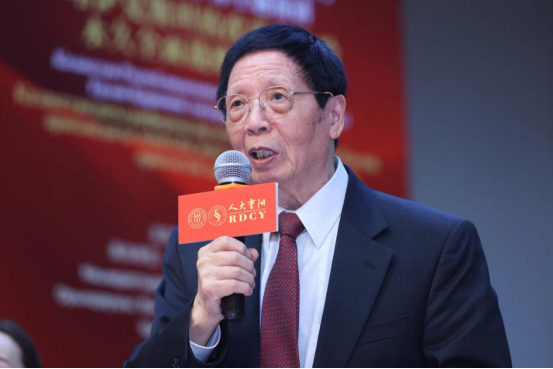
Yao Peisheng stated that Kazakhstan’s constitutional reforms in recent years have been bold and very successful, with Mr. Karin contributing significantly to this process, which can be summarized as “reform is always a work in progress.” China attaches great importance to cooperation with Kazakhstan and believes that there will be more cooperation achievements between China and Kazakhstan in the future.
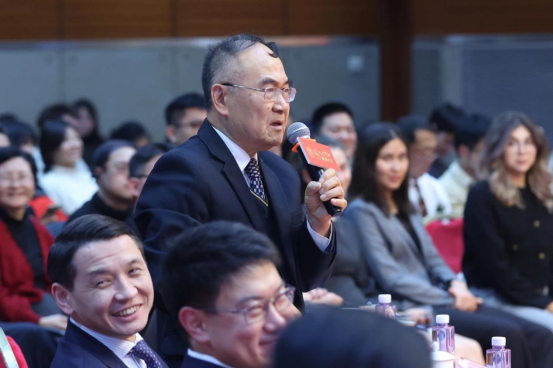
Wang Xianju noted that Mr. Karin’s speech was both theoretically profound and grounded. However, what impressed him most was Mr. Karin’s proposal on how to raise people’s social awareness and achieve ideological modernization in the rapidly developing technological era. He also exchanged in-depth views with Mr. Karin on population growth and fertility issues observed during his recent visit to Kazakhstan.
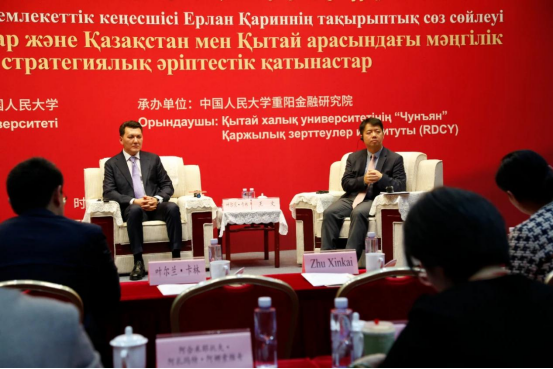
During the Q&A session, Erlan Karin answered questions raised by the audience. He mentioned in particular that when studying geopolitical changes, although the international academic community still primarily focuses on Western scholarly theories, contemporary Chinese scholars have also put forward some interesting and novel academic theoretical frameworks, sparking active discussions within the international academic community. China has a very long history of thought, with various works, ideas, schools, and thinkers emerging at various stages. This is precisely why China’s society has undergone continuous changes, reforms, and evolution, building a very solid society.
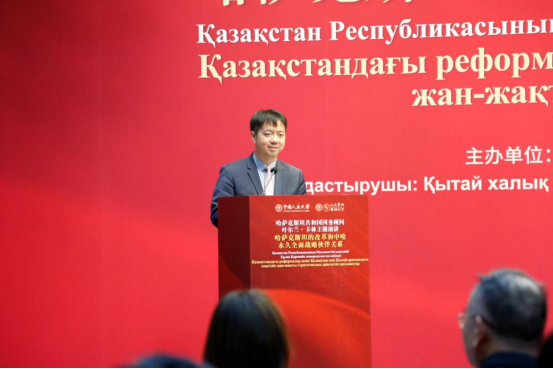
The expert interactions and audience exchanges lasted for nearly an hour, with a warm atmosphere and lively exchanges. In his conclusion, Wang Wen mentioned that Mr. Karin’s live speech made him feel the rise of a new generation of politicians in Kazakhstan and also the vitality of Kazakhstan under these years of reform. He urged the younger generation in China to strengthen communication and exchanges with the rising politicians in Kazakhstan and continue to promote the friendship between China and Kazakhstan.























































































 京公网安备 11010802037854号
京公网安备 11010802037854号





